

ISA Glossary. Top 5 Classic Studies in the Psychology of Attraction - Most of the time our articles focus on current, cutting edge studies.
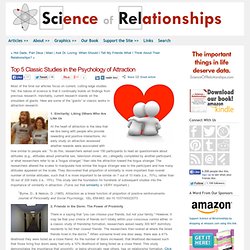
Yet, the nature of science is that it continually builds on findings from previous research. Inevitably, current research stands on the shoulders of giants. Here are some of the “giants” or classic works in attraction research: 1. Similarity: Liking Others Who Are Like Us At the heart of attraction is the idea that we like being with people who provide rewarding and positive interactions. 1Byrne, D., & Nelson, D. (1965). 2. There is a saying that “you can choose your friends, but not your family.” 2Festinger, L., Schachter, S., & Back, K. (1950). 3. In this classic study,3 researchers left the laboratory to examine men’s attraction to a female they met under one of two conditions: on a high unstable shaky bridge or on a low sturdy bridge. 3Dutton, D. 4. Which is more attractive: someone that has always liked you or someone who first did not find you appealing but eventually became more positive?
Radulove: 7 Reasons Why Math is Awesome! I’ve been seeing a lot of posts recently about how “Why math is hard” or “Why math is out to get you.”
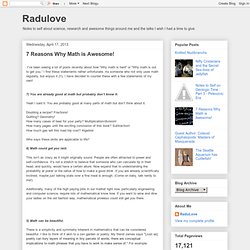
I find these statements rather unfortunate. As someone who not only uses math regularly, but enjoys it (!!) , I have decided to counter these with a few statements of my own! 7) You are already good at math but probably don’t know it. Yeah I said it. 6) Math could get you laid. This isn’t as crazy as it might originally sound. Additionally, many of the high paying jobs in our market right now, particularly engineering and computer science, require lots of mathematical know how. Get Better at Math by Disrupting Your Brain. We tend to believe that our brains work as well as they can.
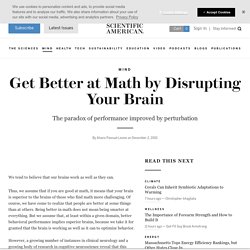
Thus, we assume that if you are good at math, it means that your brain is superior to the brains of those who find math more challenging. Of course, we have come to realize that people are better at some things than at others. Being better in math does not mean being smarter at everything. But we assume that, at least within a given domain, better behavioral performance implies superior brains, because we take it for granted that the brain is working as well as it can to optimize behavior.
However, a growing number of instances in clinical neurology and a growing body of research in cognitive neuroscience reveal that this assumption is incorrect. For example, if the brain optimizes behavior, disruption of normal brain activity ought to lead to a loss of function, and never to enhancement. The parietal lobes are thought to be critical regions in the processing of magnitudes and the representation of numbers. How to learn to love maths. Britain is about to fall in love with maths.

Well, that's the dream. Yesterday one of the government's top advisers on further education said that maths should be compulsory for all students until 18 or 19 – no matter what else they are studying. Investigating the time of oscillation of a pendulum. Students make a timer using a simple pendulum.
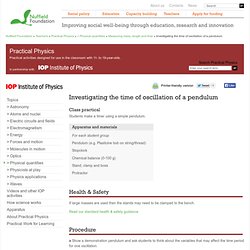
For each student group. Einstein’s Approach to Problem Solving. I am content in my later years.

I have kept my good humor and take neither myself nor the next person seriously. -From Einstein's Collected Essays “Imagination is more important than knowledge. Knowledge is limited; imagination encircles the world.” ~Albert Einstein Have a problem you just can’t figure out? Though our own problems may appear miniscule in comparison, Einstein’s attitude and approach to challenges is still quite relative relevant, even on the smallest of scales. Simplicity:Make everything as simple as possible, but not simpler. Patience:The only reason for time is so that everything doesn’t happen at once. Newton Project.
Richard Feynman – My Kind of Scientist. I’ve been meaning to write a ‘love letter’ to this man for a while, so here it is.
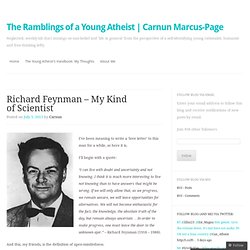
I’ll begin with a quote: “I can live with doubt and uncertainty and not knowing. I think it is much more interesting to live not knowing than to have answers that might be wrong. If we will only allow that, as we progress, we remain unsure, we will leave opportunities for alternatives. We will not become enthusiastic for the fact, the knowledge, the absolute truth of the day, but remain always uncertain … In order to make progress, one must leave the door to the unknown ajar.” – Richard Feynman (1918 – 1988). Cyberphysics, the revision website.
Royal Society. Two of the pillars of the modern physics revolution at the beginning of the twentieth century are special relativity (which has big effects when things are moving very fast) and quantum mechanics (which mostly affects the very small).
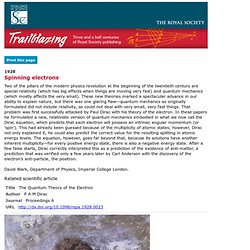
These new theories marked a spectacular advance in our ability to explain nature, but there was one glaring flaw—quantum mechanics as originally formulated did not include relativity, so could not deal with very small, very fast things. That problem was first successfully attacked by Paul Dirac with his theory of the electron. Physics.org.